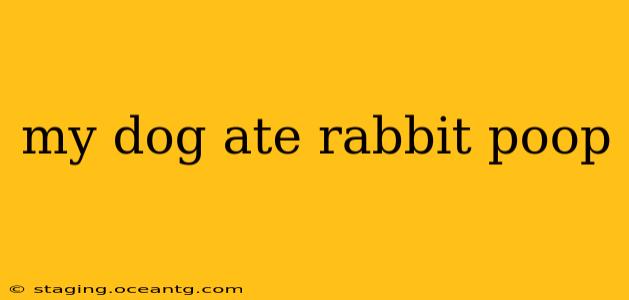Finding out your dog has eaten rabbit droppings can be alarming. While it's not usually a life-threatening event, it's definitely something to monitor and address. This guide will help you understand the potential risks, what to do immediately, and when to seek veterinary attention.
Is Rabbit Poop Harmful to Dogs?
Rabbit droppings, while generally not toxic, can contain parasites, bacteria, and harmful microorganisms. The level of risk depends on several factors, including the rabbit's health, the environment where the rabbit lives, and your dog's overall health. While a small amount of ingestion might cause no noticeable issues, a large quantity could lead to digestive upset.
What Happens if My Dog Eats Rabbit Droppings?
The most common symptoms after a dog ingests rabbit poop are gastrointestinal issues. These can include:
- Diarrhea: This is a frequent symptom and often resolves on its own within a day or two.
- Vomiting: Similar to diarrhea, vomiting can be a reaction to the foreign material in the digestive system.
- Lethargy: Your dog might seem less energetic than usual.
- Abdominal pain: You may observe your dog exhibiting signs of discomfort in their belly.
What Should I Do if My Dog Ate Rabbit Poop?
Immediate Actions:
- Observe your dog: Monitor your dog closely for any of the symptoms listed above. Note the time of ingestion and any changes in behavior or physical condition.
- Provide fresh water: Ensure your dog has access to plenty of fresh, clean water to help flush out their system.
- Avoid inducing vomiting: Unless specifically instructed by your veterinarian, do not attempt to induce vomiting at home. This can be dangerous and could worsen the situation.
- Don't give any home remedies: Avoid giving over-the-counter medications or home remedies without consulting your vet.
How Serious Is It if My Dog Ate Rabbit Droppings?
The severity depends on several factors:
- Amount ingested: A small amount is less likely to cause serious problems than a large quantity.
- Rabbit's health: A rabbit with parasites or diseases can pass these on to your dog.
- Dog's health: A dog with a compromised immune system is more vulnerable to infection.
- Presence of other toxins: Were the rabbit droppings mixed with other potentially harmful substances?
When Should I Take My Dog to the Vet?
You should seek veterinary attention immediately if your dog exhibits any of the following:
- Severe vomiting or diarrhea: Persistent or profuse vomiting or diarrhea that doesn't improve after a few hours.
- Lethargy or weakness: Significant lethargy or weakness that prevents your dog from moving around normally.
- Bloody stool or vomit: This indicates a more serious problem requiring immediate medical attention.
- Dehydration: Signs of dehydration include dry gums, sunken eyes, and lack of skin elasticity.
- Abdominal pain or distension: Your dog displays obvious signs of abdominal discomfort or a swollen belly.
Can I Prevent My Dog From Eating Rabbit Poop?
While you can't completely eliminate the risk, you can reduce it by:
- Cleaning up after rabbits: Regularly remove rabbit droppings from your yard or garden.
- Supervision: Keep a close eye on your dog, especially in areas where rabbits frequent.
- Training: Train your dog to leave droppings alone using positive reinforcement techniques.
What Parasites Can Dogs Get from Rabbit Droppings?
Several parasites can be transmitted through rabbit feces, including E. cuniculi, coccidia, and various intestinal worms. These parasites can cause a range of health problems in dogs, some serious. Early detection and treatment are crucial if your dog is exhibiting symptoms suggestive of parasitic infection.
My Dog Ate a Lot of Rabbit Poop - What Now?
If you believe your dog ingested a significant amount of rabbit droppings, contact your veterinarian immediately. They will be able to assess the situation, run tests if needed, and provide appropriate treatment. Timely intervention is crucial to prevent serious complications.
This information is for general knowledge and does not constitute veterinary advice. Always consult with a veterinarian for any concerns regarding your pet's health.
